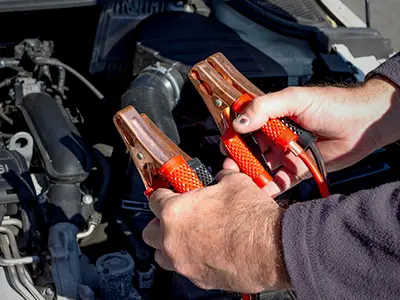What are the Best Jumper Cables for My Car or Truck?
- by Joe Weber - updated on 10/28/2024

Jumper cables can be a lifesaver when your car battery dies, but how do you know which ones to choose? Here's a breakdown of what to look for when buying jumper cables and how Batteries Plus can help you find the right pair for your vehicle.
Are Booster Cables and Jumper Cables the Same Thing?
Yes, booster cables and jumper cables are the same. The terms can be used interchangeably, so if you see "booster cables," you're looking at the same product.
What Gauge is Best for Jumper Cables?
The wire gauge refers to the thickness of the cable, measured by a number between 1 and 12. The lower the number, the thicker the wire, which allows more electricity to pass through. For most vehicles, a 6-gauge or 4-gauge set is ideal. However, if you drive a vehicle with a larger engine, you might want to opt for a 2-gauge set. Cables with a 1-gauge rating are primarily used for heavy-duty vehicles like diesel trucks. Keep in mind that thicker cables tend to be more expensive, but they're worth it for their effectiveness.
Understanding Amperage Rating
Another important factor to consider is the amperage rating of the cables. The amperage rating refers to how much electrical current the cables can handle. Jumper cables typically range from 200 to 800 amps, with the right choice depending on the size of your vehicle.
- 200-400 amps: This range works well for compact cars and smaller vehicles.
- 400-600 amps: A good middle range for sedans and SUVs.
- 600-800+ amps: Ideal for larger vehicles like trucks, vans, and those with larger engines.
If you drive a heavy-duty vehicle, opt for cables on the higher end of the amperage scale to ensure they can handle the power needed to jump-start your battery effectively. Keep in mind that higher amperage ratings typically come with thicker cables and stronger clamps, making them more durable and reliable for larger engines.
How Thick Should Jumper Cable Insulation Be?
Thicker insulation is better when it comes to jumper cables. High-quality cables have thick insulation, which helps prevent superheated arcs caused by exposed wires. These arcs can be dangerous to both you and your vehicle. Insulation also protects the wiring from cold temperatures, which can make wires brittle and prone to breakage, especially in winter conditions.
How Long Should Jumper Cables Be?
Length is another crucial factor. Anyone who's jump-started a vehicle knows how tricky it can be to position the cars close enough to connect the cables. A longer set of cables offers more flexibility. While a 10-foot set works fine if the vehicles are nose-to-nose, longer cables (at least 20 feet) are more practical, allowing more room for the charging vehicle to park behind or beside the stalled one.
What Types of Clamps Are Best?
When shopping for jumper cables, look for heavy-duty clamps with a strong grip and well-designed teeth. Proper insulation on the handles, ideally a thick rubber coating, is also important.
Material matters too. Solid copper clamps are excellent conductors of electricity, though aluminum clamps are a more budget-friendly option. However, be cautious with copper-plated clamps, as they don't perform as well as solid copper.
Do Jumper Cables Go Bad?
Yes, jumper cables can wear out over time, especially cheaper sets. If the insulation starts to wear or the wires break, it's time for a replacement. Copper-plated cables, in particular, can lose their effectiveness once the copper coating wears away, revealing less conductive metal underneath. Always store your cables coiled in a loop to avoid damaging the internal wire, and inspect them regularly for any tears or cuts.
Find Jumper Cables and Emergency Auto Supplies at Batteries Plus
At Batteries Plus, we have everything you need to keep your vehicle emergency kit stocked. We offer a wide selection of jumper cables from trusted brands like DieHard, Noco, Deka, and Quick Cable.
We'd Like to Introduce…
Batteries Plus is excited to say "Hello!" to the newest addition to the Batteries Plus family: the Batteries Plus Jumper Cables. Featuring heavy-duty construction our jumper cables will be around for years to rescue you from a dead battery.
Some additional features include:
- Available in 4-gauge for heavy-duty use and larger vehicles.
- Also available in 8-gauge for everyday use.
- Both sizes are 12 ft in length.
- Cables stay flexible, even in below-zero temperatures.
Looking for a way to jump-start your vehicle without another car? Check out our portable jump starters for a convenient solution.
Now that you've got the right jumper cables, make sure you know how to safely jump-start your car. If you're constantly jump-starting your vehicle, it might be time to address the root cause. Visit our blog for more helpful tips, including "6 Things That Drain Your Battery" and "Why Won't My Car Start? Is it the Battery, Starter, or Alternator?"